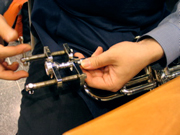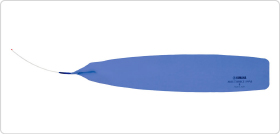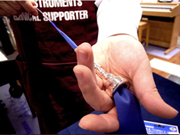Care and Maintenance of a Tuba
Don't Forget to Care for the Mouthpiece!
Trouble is common with mouthpieces
It is extremely common for brass instruments to develop issues with their mouthpieces. Keep in mind that the risk of damage to brass instruments increases as you move closer to the point where you blow in air. Since mouthpieces are replaceable and relatively cheap compared to the instrument body, players tend to take them lightly, but they are crucially important to the tuba. A damaged mouthpiece hugely impacts your performance, so please pay special attention to this part.
A dented mouthpiece cannot be restored
Mouthpieces are very frequently dented from being dropped. If the tip of the mouthpiece is not perfectly round, the vibration from your lips will not be properly transmitted to the tuba. This makes for poor performance and also hurts the pitch. Furthermore, a mouthpiece that has been dropped and bent generally cannot be returned to normal. The metal in the dented section becomes slightly elongated, for which there is no remedy. Even if the shape can be fixed, it does not mean that the function of the mouthpiece can be restored. In such cases, we have to recommend buying a new mouthpiece. Before dealing with mouthpiece maintenance, first off, make just sure that you handle it carefully so that it will not be dropped.

A carefully handled mouthpiece is perfectly round, but

A repeatedly dropped mouthpiece loses its shape
Do not a force a mouthpiece that will not come loose
If you try to use a bent mouthpiece, or if you inadvertently bang your instrument, your mouthpiece may become stuck in the tuba. This problem is extremely common, but you must not use force to remove the mouthpiece. If you forcefully grip and pull on a reluctant mouthpiece, you may bend or deform the instrument body itself. The metal of brass instruments is quite soft and can easily bend under stress.
Repair shops normally have a special jig for removing mouthpieces. The photograph shows such a jig, which has screws on both sides that slowly turn in order to pry loose a stuck mouthpiece without damaging the tuba body. So, if you find that your mouthpiece will not come out of the tuba, contact a repair professional rather than making any attempts to wrestle with it yourself.

A special jig for removing tightly stuck mouthpieces
Remove moisture with a specially designed swab
Since moisture can easily accumulate inside the mouthpiece, we recommend using a special swab to remove the moisture after you play your tuba. Ideally, you should do this after every session. The process is extremely easy and only requires starting at one end and running the swab through the inside of the mouthpiece. If you make it a habit, you will not have trouble with dirt inside the mouthpiece.

A brass instrument mouthpiece swab (small size). Medium and large sizes are also available for larger instruments.

A mouthpiece brush handles stubborn debris
There are times when we see a neglected mouthpiece that is very soiled on the inside. Since the inner diameter of a mouthpiece is very narrow, its natural sound can be affected by even a small amount of debris. We recommend cultivating the habit of using a mouthpiece brush to remove any dirt from inside this part of the tuba.

A mouthpiece brush
Musical Instrument Guide:Tuba Contents
Origins
Structure
How to Play
How the Instrument is Made
Choosing an Instrument
Trivia
- A Massive Tuba from 100 Years Ago
- Depending on the Country, a Baritone is Not a Baritone
- The Cinbasso-Popular in Italian Opera
- All Brass Instruments Have Marching Band Models
- Famous Musical Pieces for the Tuba (Bass)
- The Compensating System for the Euphonium
- There are Various Mutes for the Tuba
- Ease of Playing Pedal Tones
- Why Are Tubas So Expensive?
- Do Jazz Musicians Play the Tuba?
- Brass Band Songs Featuring the Tuba
- An Instrument in the Key of B♭, Yet the Music is Written in C
